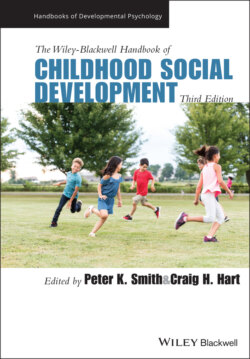Читать книгу The Wiley-Blackwell Handbook of Childhood Social Development - Группа авторов - Страница 91
CHAPTER SIX A Sociological Perspective on Social Development
ОглавлениеDimitra Hartas
Socialization is conceptualized as a contextual, interwoven process, in which children grow up within dynamic social contexts. Children’s socialization, as a process of “becoming social,” is shaped by the social conditions and structures that surround their life. Socialization is related to child development, learning, and well‐being. A sociological approach to the study of children’s socialization typically focuses on the social interactions between children, parents, peers, and significant others within their social milieu. Social interactions are defined by relationships, institutional arrangements, and access to various forms of capital in children’s life. Social structures produce and reproduce child’s status and life chances in stratified societies, ultimately shaping what Sen (1999) called “flourishing,” or achieving a life we value. As such, child socialization cannot (and should not) be discussed in the abstract, but situated within children’s social context and examined through the prism of social change. In this chapter, I offer a sociological critique on the ways in which the neoliberal restructuring of society and its resulting inequality interfere with and influence agents of socialization (e.g., parents, schools) and also imprint on child development and socialization.
By neoliberal restructuring of society, I mean social changes triggered by a political–economic paradigm that calls for unregulated markets, nationally and globally. Human organization, relationships, and decision making are shaped by the free‐market ideology whose core values are self‐interest, competition, and the creation of entrepreneurial citizens who are responsible for maximizing opportunities and life chances. The powers of the state to redistribute wealth and regulate the market for the common good are diminished and public institutions and services are expected to become privatized. The social conditions that surround people’s life are perceived as individual concerns, with the onus for resolving structural problems such as poverty being placed on individuals and families. Since the governments of UK Prime Minister Thatcher and US President Reagan, the free‐market ideology has ushered in the 21st century marked by financial crises, deep recession and austerity, and increasing inequality in the United States, United Kingdom and other European countries. My aim is to discuss child socialization in light of structural inequality and family policy changes, primarily focusing on social interactions within family and between families and schools, and also on child well‐being. In this, I consider children to be social actors who construct meaning in a variety of contexts and who also mirror and reproduce social conditions.
Child socialization is seen through social, economic, and policy changes, mostly triggered by the neoliberal restructuring of society, by looking into social interactions between parents and children in the social milieu of intensive parenting but also interactions with schools and the shifting boundaries between teacher and parent roles. Changes in child‐socialization processes are also considered through the reduction of their physical geographies and the social and political spaces they offer and, with them, opportunities for social interactions with peers and the community. Childhoods are unequal and socialization patterns reflect inequality in families’ access to various forms of capital and resources. Children’s socialization and well‐being are shaped by social class. The neoliberal organization of society and the transactional nature of human relationships have permeated every aspect of children’s socialization creating new templates of how we relate to them.
